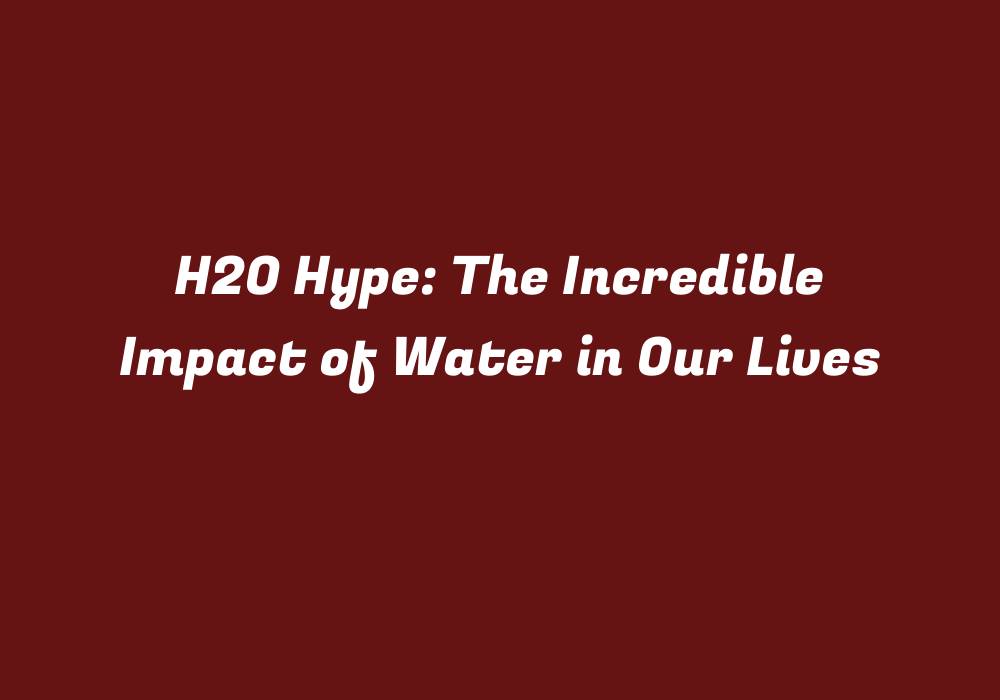Introduction
Water is a fundamental component of our lives, playing a crucial role in sustaining life on Earth as well as influencing numerous aspects of human existence. Often referred to as “the elixir of life,” this vital element is essential for everything from maintaining health and ensuring the proper functioning of various body systems to fueling industries and supporting ecosystems worldwide. In this article, we’ll explore the incredible impact of water in our lives and dive into some of its most profound implications.
Health Benefits of Water
Water has a direct influence on almost all bodily functions, making it one of the most critical factors for overall health and well-being. For instance, water helps to regulate body temperature by absorbing heat and moving it towards the skin’s surface through sweat, enabling heat dissipation in hot environments. This process also serves as an effective cooling mechanism when exercising or working outdoors.
In addition to temperature regulation, water plays a vital role in maintaining proper hydration levels within our bodies. Proper hydration is crucial for the smooth functioning of numerous body systems, including the cardiovascular, digestive, and nervous systems, ensuring they operate efficiently and effectively.
Drinking adequate amounts of water can also help to prevent various health conditions, such as kidney stones, constipation, and urinary tract infections. Moreover, staying well-hydrated can promote a clear complexion and healthy skin by keeping it moisturized and nourished from within. Furthermore, water consumption has been associated with weight management and improved metabolism, which helps to maintain energy levels throughout the day.
Water’s Impact on Industrial and Agricultural Development
Beyond its effects on human health, water plays a pivotal role in powering numerous industries and agricultural sectors worldwide. The use of water in manufacturing processes is essential for producing a wide range of products, including foodstuffs, pharmaceuticals, and textiles, as it facilitates the transportation of materials within factories and contributes to the proper functioning of machinery.
Similarly, agriculture relies heavily on access to clean water sources, as irrigation is crucial for maintaining crop growth and yield. Agriculture accounts for around 70% of global freshwater use, with approximately 92% of this amount going towards irrigation purposes. In many developing countries where rainfall is limited or unreliable, efficient irrigation systems are essential to sustain food production and support local communities.
Ecosystem Services Provided by Water
Water is an integral component of the Earth’s ecosystems, serving as a primary resource for all forms of life, including plants, animals, and humans. Ecosystem services provided by water include but are not limited to:
1. Biodiversity support: Freshwater habitats, such as rivers, lakes, and wetlands, are home to an abundance of plant and animal species that play a vital role in maintaining ecosystem balance.
2. Water purification: Streams, rivers, and other water bodies act as natural filtration systems, processing pollutants and contaminants while simultaneously providing clean drinking water for numerous life forms.
3. Flood control and erosion prevention: Rivers and streams help regulate water levels in surrounding areas by absorbing excess runoff during heavy rainfall or snowmelt events, reducing the risk of floods and mitigating soil erosion.
4. Climate regulation: Evaporation from water bodies contributes to the formation of clouds and precipitation, which play a significant role in the Earth’s climate system by influencing weather patterns and distributing moisture across various regions.
The Growing Global Water Crisis
Despite its numerous benefits, the demand for freshwater continues to increase due to rapid population growth, urbanization, and the ever-expanding agricultural sector. This, combined with factors such as climate change and unsustainable water management practices, has resulted in a critical water crisis that threatens to impact not only human life but also ecosystems worldwide.
According to the World Health Organization (WHO), over 2 billion people lack access to safely managed drinking water sources, while approximately 4.5 billion individuals face limited access to adequate sanitation facilities. This lack of clean water and proper waste management can lead to a multitude of health issues, including outbreaks of waterborne diseases such as cholera and typhoid fever.
Furthermore, the global population is expected to reach an estimated 10 billion by 2050, placing even greater strain on already limited freshwater resources. This staggering growth will only exacerbate the current water crisis unless there are significant efforts made to promote conservation and responsible management of this precious resource.
Conclusion
From its role in human health and industry to its essential contribution to ecosystem services and biodiversity, the impact of water on our lives is vast and profound. However, as global demand for freshwater continues to rise, it’s crucial that we recognize the importance of sustainable practices and responsible management to ensure this vital resource remains abundant for future generations. By prioritizing conservation and working towards a more equitable distribution of clean water across the world, we can create a healthier planet for all life on Earth to thrive.
